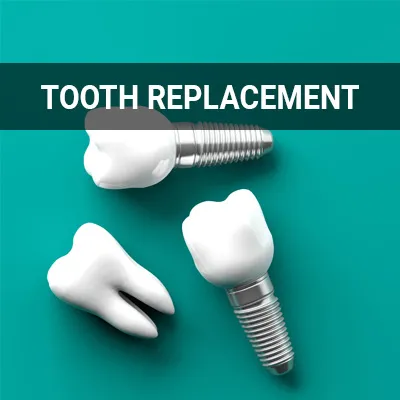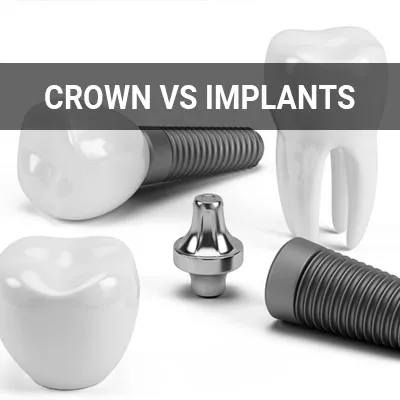Dental Implants Boca Raton, FL
Dental implants can help fill gaps left by missing or damaged teeth to restore a smile. These implants work as artificial tooth roots that lie beneath the gums and carry a dental restoration such as a crown, bridge, or dentures. Supporting the health of your teeth and facial structures can make a big difference in your quality of life and self-confidence.
If you have been considering a dental implant, you may have questions about what the process entails and why a dental implant may be beneficial. To learn more about what might be best for your particular situation, our team at Boca Perio in Boca Raton is here to help. Call us at (561) 763-1066 to learn more.
Dental Implant Basics
Patients who experience trauma, damage, or extensive decay on a tooth may need an extraction. However, gaps left behind by missing teeth can be uncomfortable while also making it difficult to bite, speak, and chew. Visible gaps also negatively impact a person's self-confidence.
A dental implant solves these concerns by providing a placement for an artificial tooth. A dental implant consists of a metal rod (usually titanium, but it can also consist of other materials) that is surgically placed directly into the jaw bone. The rod then grows into the bone, a process called osseointegration, so that it is sturdy and does not move. A permanent restoration, such as a crown, bridge, or denture is placed onto the implant.
“A dental implant consists of a metal rod (usually titanium, but it can also be made from other materials) that is surgically placed directly into the jaw bone.”
Benefits of Dental Implants
As an option to replace one or more missing teeth, dental implants provide a sturdy base for natural-appearing replacement teeth.
Dental implants can help:
- Prevent issues when trying to speak with missing teeth
- Improve the appearance of facial structures
- Improve chewing and biting with a more natural sensation
- Improve the physical appearance of a smile
Dental implants are also highly durable and designed to last a lifetime with proper care and maintenance. A periodontist or dentist may recommend a dental implant if the patient seeks a replacement tooth option and has healthy oral tissue and adequate jaw bone structure to support a surgical implant.
“Dental implants are also highly durable and designed to last a lifetime with proper care and maintenance.”
When a Bone Graft Is Needed
To have a dental implant, patients must have a sufficient amount of jaw bone present to support the implant and replacement tooth. If a patient does not have enough natural jaw bone to support an implant — because of low bone density, bone loss, infection, or otherwise — an alternative process can augment the existing bone in a bone graft procedure.
A bone graft uses bone from another place in the body to build bone in the jaw where an implant will be placed. Alternatively, it is possible to use a bone from a cadaver, animal, or synthetic source. Regardless of the source of a bone graft, the material is placed in the jaw bone using a minor surgical procedure and given time to integrate and heal (usually several months) before placing the implant.
“A bone graft uses bone from another place in the body to build bone in the jaw where an implant will be placed.”
Check out what others are saying about our dental services on Yelp: Dental Implants in Boca Raton, FL
The Treatment Process
A dental implant is a standardized process performed in stages. First, it is crucial to remove any remaining damaged tooth. Then, the periodontist will evaluate the quality of the patient's jaw bone and determine whether they require a bone graft. If necessary, we may recommend a bone graft procedure and have to let the mouth heal for a few months. After the site recovers, we will cut the gum tissue and anchor the metal post of the implant into the jawbone, like a screw. This implant will also take time to heal and "osseointegrate" into the jaw bone. Finally, we will attach an abutment to the implant in a minor surgical procedure. Then, after a few weeks of healing, we can talk about attaching a replacement tooth to the abutment.
The treatment process is safe with minimal risks. At every point during this process, we use numbing medicines to ensure the patient is as comfortable as possible. To prepare for the treatment, it is a good idea to ask questions pertaining to the procedure. Patients should also mention any prescription medications they are currently taking or may need to take after the procedure. Patients typically also ask about the predicted recovery timeline based on their personal health history and current condition.
“At every point during this process, we use numbing medicines to ensure the patient is as comfortable as possible.”
Questions Answered on This Page
Q. What are the benefits of dental implants?
Q. When is a bone graft necessary?
Q. What is the dental implant process like?
Q. How do I take care of a dental implant?
People Also Ask
Q. How do dental implants and dental crowns differ?
Q. What is the process of tooth replacement?
Q. What kind of procedures does a periodontist perform?
Follow-Up Care
After each stage of the implant process, patients will receive specific instructions for follow-up care. Slight pain or bruising can be expected, which is managed with pain medications. Patients will be required to eat only soft foods for a while as the site heals.
After the entire process is completed, caring for a dental implant is a lot like caring for a natural tooth. Patients will need to brush the implant, artificial tooth, and the surrounding area daily to keep everything clean and free of disease-causing bacteria. Avoiding habits such as smoking, chewing hard materials, and grinding or clenching can also help maintain the dental implant and keep it functioning well for a longer period of time.
Patients will need to check in periodically for an examination to check that the implant is functioning properly and that the procedure was successful. If the implant fails, then it will be necessary to remove it and clean the area. In that case, the patient may be able to try another implant again after a few months of healing.
“You will need to brush the implant, artificial tooth, and the surrounding area daily to keep everything healthy and free of disease-causing bacteria.”
Frequently Asked Questions
Q. How likely is it that a dental implant will be successful?
A. If you have a healthy jaw bone, a dental implant will likely be a success. If you are not immunocompromised and you have a bone structure that can support the implant, it will likely be stable over the long term. Research shows that the survival rate of dental implants in healthy people during a 10-year observation period is higher than 90%.
Q. How does a dental implant compare to other tooth replacement options?
A. Dental implants tend to be more natural-appearing and natural-feeling compared to other tooth replacement options, such as bridgework or dentures. They remain fixed, so there is no risk of movement while eating or talking. According to the American Academy of Implant Dentistry (AAID), they can also help support the health of your jaw bone.
Q. Who can get dental implants?
A. Both children and adults can successfully get dental implants to replace missing teeth. However, the AAID recommends waiting until a child's facial development has finished before pursuing dental implants — this will be toward the end of their teenage years. The elderly may also receive dental implants, provided they have an adequately supportive jaw bone structure.
Q. When is a bone graft necessary prior to dental implantation?
A. A bone graft procedure may be necessary for patients with insufficient jaw bone mass. Dental implants require strong bone density to hold and maintain the metal rod. We will inform patients if they need a bone graft well before the implant procedure, during the consultation appointment.
Q. What health characteristics might make a person more likely to get a dental implant?
A. You may prefer a dental implant over other tooth replacement options if you have a healthy bone structure to support the implant. Your immune system must also be robust so that you can fully heal and not be vulnerable to infection. You will also be more successful if you do not smoke tobacco.
Start Feeling Better – Visit Us Today
By visiting us as soon as possible, our team can help get you the professional treatment you need. Instead of waiting around and allowing the symptoms to get worse, we can provide you with treatment options.
Definitions
Call Us Today
If you are interested in dental implants, our team can help you better understand the procedure and what your condition may entail. Contact our team today at (561) 763-1066 to find out which safe and effective option may be right for you or to schedule an appointment.
Helpful Related Links
- American Academy of Periodontology (AAP). American Academy of Periodontology (AAP). 2025
- Center for Disease Control and Prevention (CDC), Periodontal Disease Page. Center for Disease Control and Prevention (CDC), Periodontal Disease Page. 2025
- WebMD, What Is a Periodontist?. WebMD, What Is a Periodontist?. 2025
About our business, license, and website security
- Boca Perio was established in 1990.
- We accept the following payment methods: American Express, Cash, Check, Discover, MasterCard, and Visa
- We serve patients from the following counties: Palm Beach County and Broward County
- We serve patients from the following cities: Boca Raton, Delray Beach, Coral Springs, Pompano Beach and Deerfield Beach
- FL (License #DN6423). View License Information and Specifics
- Healthgrades. View Background Information and Reviews
- Norton Safe Web. View Details
- Trend Micro Site Safety Center. View Details
Back to top of Dental Implants










